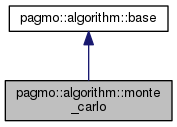|
PaGMO
1.1.5
|
|
PaGMO
1.1.5
|
Monte Carlo algorithm. More...
#include <monte_carlo.h>

Public Member Functions | |
| monte_carlo (int=1) | |
| Constructor from number of iterations. | |
| base_ptr | clone () const |
| Clone method. | |
| void | evolve (population &) const |
| Evolve method. | |
| std::string | get_name () const |
| Algorithm name. | |
 Public Member Functions inherited from pagmo::algorithm::base Public Member Functions inherited from pagmo::algorithm::base | |
| base () | |
| Default constructor. More... | |
| virtual | ~base () |
| Trivial destructor. More... | |
| std::string | human_readable () const |
| Return human readable representation of the algorithm. More... | |
| void | set_screen_output (const bool p) |
| Setter-Getter for protected m_screen_output data. More... | |
| bool | get_screen_output () const |
| Gets screen output. More... | |
| void | reset_rngs (const unsigned int) const |
| Resets the seed of the internal rngs using a user-provided seed. More... | |
Friends | |
| class | boost::serialization::access |
Additional Inherited Members | |
 Protected Attributes inherited from pagmo::algorithm::base Protected Attributes inherited from pagmo::algorithm::base | |
| bool | m_screen_output |
| Indicates to the derived class whether to print stuff on screen. | |
| rng_double | m_drng |
| Random number generator for double-precision floating point values. | |
| rng_uint32 | m_urng |
| Random number generator for unsigned integer values. | |
| unsigned int | m_fevals |
| A counter for the number of function evaluations. | |
Monte Carlo algorithm.
This algorithm will simply evaluate random values within the problem bounds for the number of times specified and return the best.
Definition at line 44 of file monte_carlo.h.
 1.8.9.1
1.8.9.1